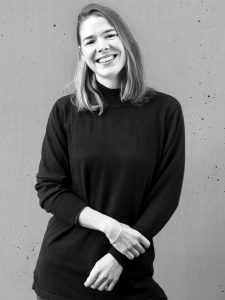Annika Sellmann

Shortbio
- 2021–2022 Freelance work in urban heritage conservation
- 2017–2019 Research traineeship at Museum Angewandte Kunst Frankfurt
- 2015–2017 Master’s degree in Denkmalpflege / Heritage Conservation, Otto-Friedrich-Universität Bamberg
- 2014–2015 Student assistant, Museum für Kunst und Gewerbe Hamburg, Photography and New Media Collection
- 2009–2015 Master’s degree in art history, art pedagogy and sociology, Goethe University Frankfurt am Main, University of Aix-Marseille
Contact
Technical University Berlin Faculty VI – Planning Building Environment Institute of Urban and Regional Planning Chair of Heritage Conservation DFG Research Training Group 2227 »Identity and Heritage« D-10623 Berlin
Office: Ernst-Reuter-Platz 1, 10587 Berlin, Room BH-A 339/340 a.sellmann[at]tu-berlin.de
The Integration of Architectural Heritage Interests in Processes of Urban Development and Planning – Researching Model Cities from the 1975 European Architectural Heritage Year Pilot Programme and their Impact on Local Living Environments.
Looking at the 1970s – a time that brought the institutionalization of heritage conservation in western Europe and shaped its public discourse to the present – I focus on the European Architectural Heritage Year (EAHY) 1975. Architectural Ensembles, groups of spatially related built structures complementing the traditional view of singular monuments, gained public as well as professional attention for a second time after the emergence of the idea at the end of the 19th century. The Council of Europe initiated a Programme of Pilot Projects and promoted integrated conservation as new method of urban planning procedures which was trialled in 51 cities in 17 countries to demonstrate a new practice of conservation which focussed on current social issues.
Despite the EAHY being ascribed great importance from the disciplinary field of heritage conservation, mainly the written sources of the EAHY have been cited, as opposed to the redevelopment schemes of the Pilot Projects. My dissertation project focusses on urban structures that provide housing and other functions of daily life but also anchor urban, local, regional or national constructs of identity. I research whether working with a planning tool, which merges the debate on the conservation of built heritage with the interests of all stakeholders involved (urban planning, architecture, residents, citizens) at an early stage, can lead to decisions favouring more heterogenous urban spaces. This will not only shed a light on the role of professional, newly institutionalised authorities and the opportunities of individual participation, but by making out the interplay of these processes with tendencies of homogenisation, it aims to contribute to the wider discourse on conservation areas, townscapes and reconstruction.
Publications (Selection)
Heritage, Instandbesetzung und fiktive Heimaten. Annika Sellmann im Gespräch mit Gerhard Vinken, in: Mythos Handwerk, Katalog anlässlich der gleichnamigen Ausstellung im Museum Angewandte Kunst Frankfurt, Kunstgewerbemuseum Dresden, Vorarlberg Museum Bregenz und Werkraum Bregenzerwald, Wien 2022, S. 42–45.
Frank Aulbach, Annika Sellmann: Blicke auf Kirbergs Alte Kellerei, Spuren der Geschichte: erforscht, aufgearbeitet und wieder sichtbar präsentiert, in: Denkmal Hessen, Zeitschrift des Landesamtes für Denkmalpflege Hessen (Nr. 1), 2021, S.44–48.
Hausgarten und Kleingarten, in: Christina Treutlein, Philipp Sturm, ernst-maygesellschaft e. v.: mayhaus, Stuttgart 2021, S.111–121.
Klaus Klemp, Annika Sellmann, Matthias Wagner K, Grit Weber (Hg.): Moderne am Main 1919–1933, Katalog anlässlich der gleichnamigen Ausstellung im Museum Angewandte Kunst Frankfurt, Stuttgart 2019.
Lectures (Selection)
„Solarkataster – der Weg zur Kartierung“, 8. Hessisches Denkmalgespräch, Freilichtmuseum Hessenpark, 7.10.2022.
„Die Gartenlauben von Margarete Schütte-Lihotzky“, Vortrag für die ernst-may-gesellschaft e.V. im Vereinsheim des KGV-Heddernheim e.V., Frankfurt am Main, 15.09.2022.
„Wider das rasche Schwinden – Ein Archiv für die „Ländlichen Denkmäler der Kultur“ im Museum für Kunst und Gewerbe Hamburg 1898–1915“, Collecting Loss, 2. Jahrestagung des DFG-Graduiertenkollegs 2227 “Identität und Erbe”, Weimar 16.11.18 (Aufsatz in Tagungsband: Weimar 2021, S. 32–41).